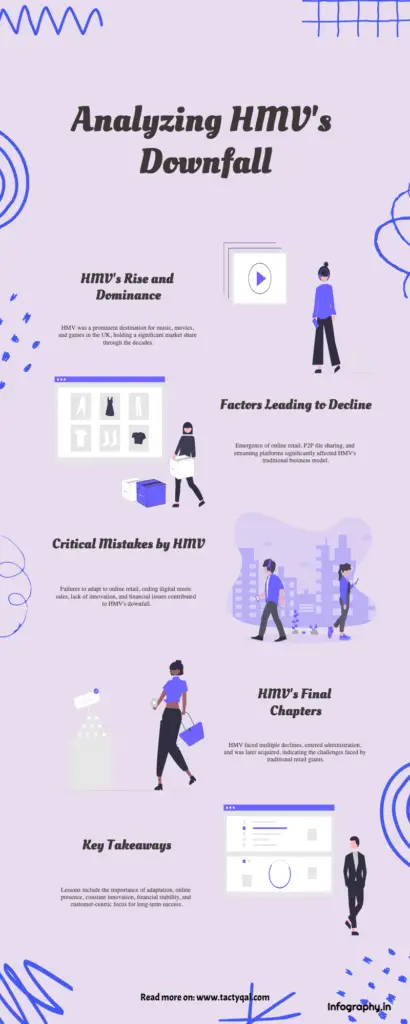Why HMV failed? A Retrospective Look at the Decline of a Retail Giant
HMV, which once stood tall as the go-to destination for music, movies, and games in the UK, ultimately crumbled under the weight of changing consumer habits and disruption from online retailers.
Let’s take a thoughtful, introspective look at the key factors that led to HMV’s downfall.
Back When HMV Was King
First things first, let’s rewind and remember HMV in its heyday. HMV (which originally stood for His Master’s Voice) opened its first store on London’s Oxford Street in 1921. For decades, HMV represented the absolute authority in entertainment retail in the UK. HMV stores were vast wonderlands brimming with shelves upon shelves stocked with music, movies, and games. For many, a trip to HMV was a joyous ritual and rite of passage.
In the 1960s, HMV accounted for 70% of all recorded music sales in the UK. Even into the 90s, HMV maintained a dominant 40% market share of entertainment sales. HMV’s tottering seven-floor flagship store on Oxford Street, which opened in 1986, once attracted over 9 million customers per year.
The Winds of Change
However, by the late 1990s, the first rumblings of trouble started stirring. HMV was slow to react to emerging trends that would forever alter how people purchased and consumed entertainment. These pivotal moments planted the seeds of HMV’s undoing:
The Rise of Online Retail
In 1994, a little company called Amazon opened an online bookstore. At first, HMV didn’t consider online retail a threat. After all, browsing aisles brimming with music was an experience shopping online could never replicate. However, as internet speeds increased and online shopping became more convenient than in-store visits, consumers started shifting their spend online.
P2P File Sharing Triggers Decline in Music Sales
The launch of Napster in 1999, followed by other peer-to-peer file-sharing platforms like LimeWire and Kazaa, enabled people to easily download songs for free rather than buying CDs. This precipitated a sharp decline in music sales in the early 2000s, directly impacting HMV’s core business.
Streaming Platforms Limit the Relevance of Physical Music Formats
As broadband internet and devices like the iPod became widespread in the 2000s, consumers gravitated to legal streaming platforms like Spotify. With instant access to millions of songs in your pocket, buying a physical CD seemed pointless. HMV’s aisles of CDs and DVDs were becoming obsolete.
Collectively, these trends fundamentally changed how people discovered and listened to music. For HMV, the writing was on the wall – adapt or die. Unfortunately, HMV responded too slowly and too timidly.
Critical Mistakes That Led to HMV’s Downfall
HMV was myopically focused on in-store retail when seismic changes were happening outside its four walls. Management failed to fully appreciate how online retail and new technologies threatened HMV’s entire value proposition.
Mistake #1: Not Prioritizing Online Retail
As high street foot traffic dwindled, HMV was slow to pivot to online retail. HMV launched its online store in 1999, but it was clearly an afterthought lacking integration with physical stores. In comparison, Amazon relentlessly focused on frictionless online retail and deliver an ever-improving customer experience.
Mistake #2: Ceding Digital Music Sales to Apple
When Apple launched the iTunes Music Store in 2003, it became the dominant platform for digital music sales overnight. Rather than launch its own download store, HMV handed this fast-growing revenue stream to Apple. HMV’s belated efforts to sell digital music through in-store kiosks never gained traction.
Mistake #3: Failure to Reinvent In-Store Experience
As online shopping boomed, HMV clung to its outdated big-box store format rather than reimagining its physical retail experience. Contrast this with Apple stores, which successfully incorporated digital experiences and positioned stores as modern community hubs. HMV stores just seemed neglected and past their prime.
Mistake #4: Lack of Innovation
Beyond some half-hearted efforts like digital kiosks, HMV showed little appetite for innovation or experimentation. It doubled down on physical media and merch when consumers wanted omnichannel experiences. If HMV had embraced innovation and tested novel concepts, it may have found ways to remain relevant.
Mistake #5: Debt and Cash Flow Issues
Slower sales caused HMV to amass significant debts. Vendors tightened payment terms, choking cash flow. HMV sold its book chain Waterstones and its iconic London Oxford Street flagship store to improve finances, but it was too little too late.
Ultimately, HMV placed short-term earnings over long-term strategic reinvention. Minor tweaks can’t save a fundamentally flawed strategy. By the time HMV tried seriously pivoting to digital and omnichannel retail, it was too late. The tanker had already hit the iceberg.
The Final Chapter
After multiple sales declines and profit warnings, HMV collapsed into administration in January 2013. Hilco acquired HMV’s debt and relaunched it as a smaller chain focused just on entertainment retail. However, HMV entered administration again in December 2018 before being rescued by Canadian retailer Sunrise Records. HMV continues operating today as a shadow of its former self.
While the demise of this high street icon is sad, the writing was on the wall for years. Nostalgia could not save HMV – only bold, decisive action could have. Its hesitation and lack of vision prevented HMV from finding a way to thrive in the digital age.
HMV’s journey shows how even “untouchable” brands can spectacularly fall from grace when they don’t or can’t adapt to changing consumer expectations. As we’ve seen in other industries, clinging to the past rarely leads to a happy ending. Consistently delivering value, innovation, and convenience for customers is what ensures enduring success.
Lessons from HMV’s Downfall: A Quiz for Entrepreneurs
- Did HMV prioritize online retail when it became popular? (Yes/No)
- Did HMV launch its own digital music download store to compete with iTunes? (Yes/No)
- Did HMV reinvent its in-store experience to incorporate digital experiences? (Yes/No)
- Did HMV embrace innovation and experiment with novel concepts? (Yes/No)
- Did HMV have debt and cash flow issues due to declining sales? (Yes/No)
Scoring: Give 1 point for each “Yes” answer to questions 1, 2, 3, and 4. Give 1 point for a “No” answer to question 5.
Scoring Interpretation: 0 points: Excellent! You’ve learned the lessons from HMV’s downfall and are ready to tread carefully as an entrepreneur.
1-2 points: Good effort, but you may need to review the critical mistakes HMV made to avoid a similar fate.
3-4 points: Careful! You’re at risk of repeating HMV’s missteps. Thoroughly review the lessons from their downfall before proceeding.
5 points: You seem to have missed all the key lessons from HMV’s decline. Strongly recommend revisiting this case study before embarking on your entrepreneurial journey.
Related Posts
Key Takeaways from HMV’s Downfall
HMV’s painful decline provides some valuable business lessons:
- Adapt or die – No brand is immune to disruption. Reinvent your value proposition before competitors force you to.
- Online matters – Omnichannel presence is critical today. Don’t treat e-commerce as an afterthought.
- Innovate constantly – Regularly test new formats, experiences, and offerings. Surprise and delight customers.
- Debt kills – Don’t sacrifice long-term success for short-term profits. Get your financial house in order.
- Customer obsessed – Stay laser-focused on customer needs, not your operational comfort zone.
HMV perhaps lives on today mostly due to nostalgia and brand recognition. But nostalgia fades. To survive, brands need to give people compelling reasons to keep coming back.
Does your brand pass that test?











